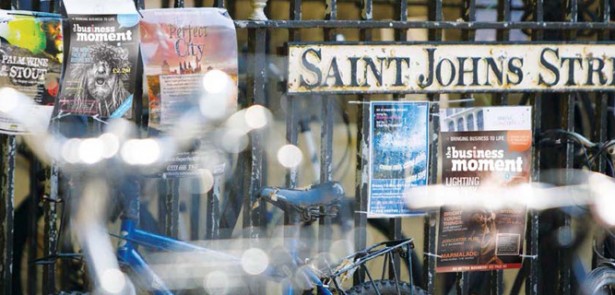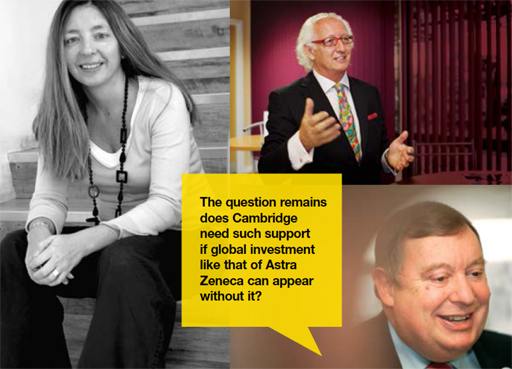A Tale of Two Cities

Cambridge and Peterborough are thriving centres of business at either end of the county – yet it sometimes seems they are worlds apart. Peterborough is the new kid on the block with its eye on the prize; Cambridge the heavy hitter with a centuries-old reputation for excellence. But are they now destined to compete for business, or collaborate – and are there lessons they can learn from each other? TOBY VENABLES investigates
When I started asking leading businesspeople questions about the relative merits of Cambridge and Peterborough, I had no idea where they would lead. But having spent many years working in both, I was intrigued by the contrasts, and also by how little they seemed to regard each other. There was a time when Peterborough would not have dared think itself Cambridge’s equal, and Cambridge would have been too busy looking towards London to spare Peterborough much thought. But things have changed. Peterborough is now the fastest growing city in England, with cultural events that have put it firmly on the international map.
Cambridge, too, is thriving – but is testing its infrastructure to the limit. With economic recovery on the way, I wanted to find out how each would fare, what they offered new businesses, and how their future relationship – if any – might develop.
“TWO HOUSEHOLDS, BOTH ALIKE IN DIGNITY…”
When it comes to a debate about the relative benefits of Cambridge and Peterborough, John Bridge OBE literally has a foot in both camps. He is Chief Executive of Cambridgeshire Chambers of Commerce, was involved in the formation of the Greater-Cambridge Greater- Peterborough Enterprise Partnership and runs a business – C W Bridge Ltd – in Huntingdon, slap bang between the two. So, why does he think a business might choose one city over the other?
‘I think there are a number of key things,’ he says. ‘Cambridge has its own magic. It’s an internationally renowned brand. Peterborough is very positively growth driven, and actually promotes itself – from an internal investment point of view and a national point of view – much more effectively than Cambridge.’ Given Cambridge’s lofty status on the business scene – it even has a phenomenon named after it – theassertion that Peterborough is doingsomething better may come as a surprise.
“In Cambridge… what we have is a local authority system that’s not fit for purpose in this modern day and age for an international city”
But it highlights an issue that is to become a recurring theme throughout our investigations. ‘It happens because we have two different systems operating. In Peterborough we have a unitary authority, where there can be a single focus, and of course we have Opportunity Peterborough as a focus where one can look at marketing, developing and liaising with all prospective investors in a streamlined programme. In Cambridge we have too many different mechanisms. There’s a city council, county council and local district councils, so there is not that single focus. In fact, what we have is a local authority system that’s not fit for purpose in this modern day and age for an international city.’
Pretty damning considering Cambridge is home to one of the world’s greatest universities and a global leader in software, electronics and biotech ‘The economic differences betweenCambridge and Peterborough are wellknown,’ says Neil Darwin. He is CEOof the organisation mentioned by JohnBridge – Opportunity Peterborough – aneconomic development company set upto support local businesses and to attractnew companies to the city. ‘Behind thescenes, however, support to businessis different. In Peterborough the Councilinvests in Opportunity Peterborough,and in doing so recognises the need toraise the city’s profile and provide directsupport to the business community. Inmany senses, having a Unitary Councilin Peterborough makes this an easyinvestment to make.’He echoes John Bridge’sobservations about Cambridge – butwith one significant caveat. ‘It doesbenefit from the existence of a numberof groups, but none that bring alleconomic development issues togetheras Opportunity Peterborough does.However, the question remains doesCambridge need such support if globalinvestment like that of Astra Zeneca canappear without it?’
It’s a fair point. So what if Cambridge doesn’t actively promote itself so much? Does it really matter when its reputation is so great that people come knocking at its door anyway? And is there anything in this that Peterborough can learn from its well-to-do cousin?
TOURISM
In business, customer confidence is often nine tenths of the battle, and clearly, a key factor is how a city is perceived. ‘It’s one of the key things that makes or breaks a place in terms of whether people will come to visit, live, invest, work or study,’ says Douglas Gyte. He is Strategic Tourism Manager for Peterborough City Council, and has been involved in destination development for 25 years, writing his PhD on the ways people form an image about places they choose to visit. ‘I talk to people who don’t live here, who live miles away, and often they struggle to have an image of Peterborough at all. Sometimes they know there’s a cathedral. Sometimes they know it’s grown a lot and ask “Isn’t it a new town?” Generally they think of it as a nice enough place, but the good thing, from my perspective, is having a clear canvas, without much negative baggage. A lot of people do know it has the cathedral and that it is a heritage city, and do know it’s a successful “expanded” town with good road networks.’ So, Peterborough has a clear canvas.
Fine. But how does it now go about filling that blank in a way that is attractive to visitors and to business? One issue with Peterborough, according to Douglas Gyte, is that it’s not… [cont]
















